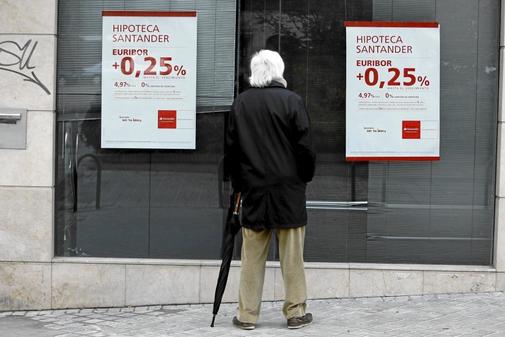The fear of a new recession has spread like a virus throughout the Spanish economy as a whole. The demand for credit from homes and businesses fell in the third quarter of the year for the first time since 2013, when the country suffered a second recession with a 1.3% drop in GDP.
On the other hand, in the euro area as a whole, the consumption of financing increases in the case of households and remains stable for companies. This is stated in the bank loan survey published on Tuesday by the Bank of Spain with the information collected from the 10 main financial institutions in the country.
The data offered by the financial supervisor are devastating and show the brake on the Spanish economy at the turn of the summer . The absence of credit ends up becoming a stoppage in production that has led several economic analysis institutions to revise their economic growth prospects for the year as a whole, which in turn translates into more fear and distrust of consumers.
For the first time in six years, the decrease in the volume of credit has taken place in its three main segments: companies, homes for home purchases and homes for consumption. In both cases, the uncertainty about what will happen to the economy in the coming months coincides as a cause of the decline, a fact that delays investment decisions in the first case and slows the purchase of housing - or durable consumer goods such as cars, for example- in the second and third.
From there, each sector has its peculiarities. In the case of companies, the fall in bank financing has to do with the reduction of investments in fixed capital and the greater use of alternative financing from alternative sources, such as fixed income securities, the issuance of new shares and internal financing of partners and shareholders.
In addition, banks have tightened the concession criteria for small and medium enterprises due to the greater perception of risk. The bleeding in this segment is terrible: the granting of credit falls for all maturity periods (short and long term) and for all sizes of companies, including SMEs that dominate the national corporate fabric.
On the other hand, the demand for home loans is fundamentally linked to the brake on the granting of mortgages, which the entities link to lower consumer confidence, worsening of the real estate sector and regulatory changes due to the entry of the new mortgage law. . The fall has occurred despite the improvement of the general financing conditions due to increased competition and the reduction of interest rates in Europe.
The signature of consumer-linked loans has also declined, a sector on which entities were supporting their business encouraged by high interest rates and the apathy of other more traditional segments. In the third quarter the "slight fall" was linked to the tightening of the concession criteria due to the worsening of the solvency of the borrowers and the lower risk tolerance of the entities due to a deterioration of the general economic outlook, explains the Bank of Spain .
The fall in credit has disrupted the forecasts made by Spanish entities, which provided for a decrease in financing in the business sector but a continued increase in loans linked to the purchase of housing. This new situation, added to the complicated management of the environment of negative interest rates in Europe, will force entities to act on the last stretch of the year to avoid a sharp drop in their income statement at the end of the year.
However, banks are optimistic for the last quarter of the year in relation to the granting of mortgages and expect stability in consumer financing coinciding with the Christmas campaign and other promotions such as Black Friday. In the case of entities, the sector expects a prolongation of the downward trend in the coming months.
According to the criteria of The Trust Project
Know more- Europe
- Black friday
- GDP
- Mortgages
- economy
- savings and consumption
Sovereign challenge Catalonia fears another 'shock' even though it still pays the 1-O economic bill
Macroeconomic projections The Bank of Spain warns of the slowdown: growth forecast sinks and lowers job creation
Housing Mortgage war between banks triggers 'unfaithful' clients and fixed-rate loans

